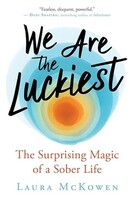Book notes: We Are the Luckiest
Mar 19, 2024
By Laura McKowen.
Recommended in a newspaper (I forgot which one) at the start of this year in a list of books for the “sober curious”. The author talks about her negative relationship with alcohol, herself, and the benefits of a sober life.
Scoring:
- Axe for the frozen sea: 7/10.
- Page count: 225. Felt like: 225.
I’ve become more aware about how pervasive alcohol is. The National Institute on Alcohol Abuse and Alcoholism reports that in the past month, about 50% of people age 18 and older in the US drank in the past month, and about 20% reported binge drinking. This despite the World Health Organization saying no level of alcohol consumption is safe for our health. On a personal level, I notice I feel and sleep much better if I don’t have any alcohol.
I can imagine a day in the future where alcohol drops out of fashion like the decline in smoking. I picked up this book wondering if it would offer a glimpse of what an alcohol-free life might look like.
There are many dark moments in the author’s struggle with alcohol addiction. One night while she was blackout drunk she left her 4 year old daughter in a hotel room by herself overnight. She woke one morning to see she had violently thrown up red wine all over the hallway to her house and cleaned it up with her daughter watching and asking questions.
Much of the book talks about the things that worked for her to get sober, although as she notes the only thing that sober people have in common is they all managed to stop drinking. Each person walks a different path.
I was shocked to see how alcohol affected the author’s relationship with men. Having a drink was the only way she knew how to date/flirt, and she had to re-learn how to interact with men once she was sober. I wonder how many people approach dating this way?
Once she stopped drinking, it took many years but she found she had a much richer, mindful life. She was able to have a better, more truthful relationship with herself. She had more energy for her creative and meaningful pursuits in life, and realized that alcohol had been holding her back. The process also gave her the strong “diamond” in her heart to trust her view of herself and be resilient to criticism.
I enjoyed her take on the thin moral line for being labeled an “alcoholic”, which she calls “the wrong damn question”. Instead your perspective should be: “How can I take the best care of myself possible, so I can feel connected and alive in my life?”
I recommend this book as an interesting case study with good nuggets of wisdom even if you don’t drink.